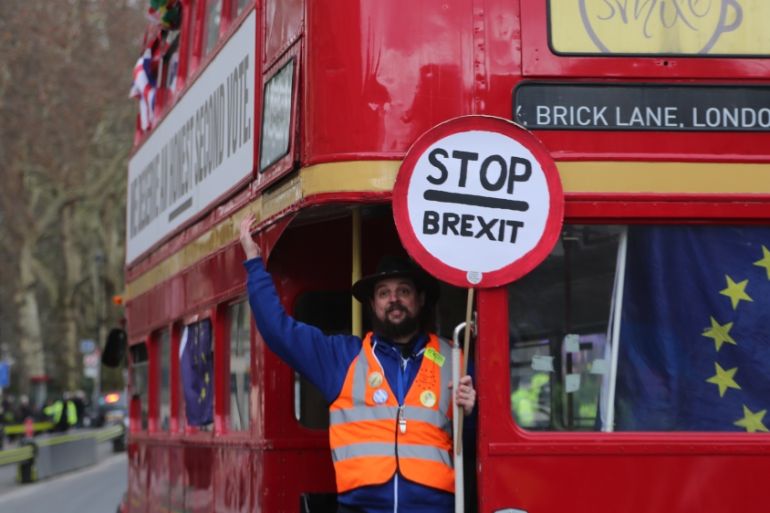What’s next for Brexit after PM May’s latest defeat?
With just weeks to go before EU exit deadline, divorce deal remains as thorny as at the start of negotiations.

London, United Kingdom – British Prime Minister Theresa May suffered another resounding defeat in parliament when her Brexit deal was voted down by 391 MPs against 242 who supported it.
More MPs decided to get on board on Tuesday and voted in favour of the deal than last January when it was defeated by a larger margin of 230.
Keep reading
list of 4 itemsNorthern Ireland agreement could end deadlock, restore government
Forced to become British: How Brexit created a new European diaspora
Number of Britons regretting Brexit hits new record high: Survey
But the legally binding changes the prime minister announced on Monday night – after a last-minute meeting with the president of the European Commission, Jean-Claude Juncker – did not prove enough for the hard Brexiter wing of her party and for the Democratic Unionist Party (DUP), the prime minister’s ally in Northern Ireland.
They both voted against it out of concerns over the so-called backstop protocol of the withdrawal agreement, an insurance policy to keep an open border in the island of Ireland. They argue the backstop could trap the UK within the European Union’s trade rules indefinitely, and create a divide between Northern Ireland and the rest of the country.
With fewer than three weeks to go before the Brexit deadline on March 29, the issue of the only land border between the EU and the United Kingdom after the UK’s exit from the block remains as thorny as at the start of the negotiations. All options remain on the table for how Brexit might resolve.
|
|
Delaying Brexit
This appears to be the most likely option at the moment, but it doesn’t rule out any of the others.
MPs will get to cast two more votes this week, the first to rule out a “no-deal” exit on March 29, and the second to delay Brexit by extending Article 50 of the EU treaty.
Confident of the support of some conservative MPs who had voted against her in the last “meaningful vote”, the prime minister could also decide to put forward a request to extend article 50 herself. This would buy her time to try and get more concessions from the EU and hold a third vote on her deal.
May wants to avoid any extension that would oblige the UK to take part in the European Parliament elections on May 23 to 26 while in the process of exiting the bloc. That means the new deadline would have to be before the new assembly’s first sitting on July 2.
But extending Article 50 – which allows member states to leave the bloc – is not unilateral; all other 27 EU member states need to agree.
Any decision on a delay will be taken when the European Council next convenes, on March 21-22.
No deal
MPs on Wednesday can rule out leaving the EU without a deal on March 29, but a hard Brexit remains the default option in EU law.
Fears for the consequences of a no-deal Brexit on British businesses, as well as on UK and EU citizens, have increased since May’s deal was defeated two months ago.
Businesses, particularly smaller ones, have admitted they’re not ready.
“The EU has done everything it can to help get the Withdrawal Agreement over the line. The impasse can only be solved in the UK. Our ‘no-deal’ preparations are now more important than ever before,” said the EU’s chief Brexit negotiator, Michel Barnier, in a tweet after the second meaningful vote.
Brexiters hold the view that no deal is better than a bad deal. Former foreign secretary Boris Johnson said on Tuesday leaving without a deal is “the only safe route out” of the EU.
|
|
The threat of a no-deal Brexit has been key to May’s negotiating strategy with the EU.
Another referendum
Opposition Labour leader Jeremy Corbyn announced two weeks ago that his party is committed to backing a second referendum. What options would be on the ballot papers would have to be established by parliament, but they could include remaining in the EU, leaving without a deal, or a number of withdrawal options, including May’s deal.
A second referendum would have to gain parliamentary approval, and at the moment it remains unclear if there is a majority for it. Some Labour MPs from leave-voting constituencies would side against it.
General election
Corbyn called for a general election after the deal was defeated again on Tuesday. However, he also said the opposition was ready to work with the government to reach a consensus on a deal.
If that is the route the prime minister decides to pursue, it would be hard for her to keep her party together, according to John Curtice, professor of politics at Strathclyde University and senior research fellow at NatCen Social Research.
While May said during her speech to the Commons that MPs will now have to make choices as to whether they want no Brexit, a second referendum, or a different deal, “what she did not indicate is what, if anything, the government might do to enable the house to make that choice”, said Curtice.
“What would be crucial is what amendments will be put down on Thursday to begin opening up that process,” Curtice told Al Jazeera.
The preconditions for a general election might then arise if “the government finds itself being obliged by the House of Commons to pursue a policy direction that the [Conservative] party can no longer cohere around. And, therefore, basically the administration collapses,” said Curtice. “But we’re not there yet.”